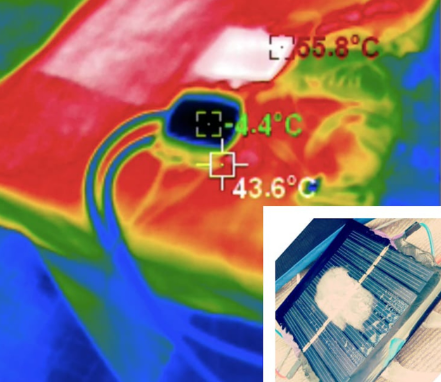Developed by Shoolini University in Himachal Pradesh, the innovation avoids greenhouse gas emissions and cuts long-term costs.
In a significant advancement for renewable energy, researchers at Shoolini University in Himachal Pradesh have unveiled a thermoelectric cooling (TEC) system that enhances solar panel efficiency by up to 27%. This innovation addresses the persistent issue of solar panel overheating, a factor that often hampers performance and reduces lifespan.

The TEC system converts excess heat from solar panels into electricity, thereby maintaining optimal operating temperatures. In experimental setups conducted in Shimla, panels equipped with the TEC system maintained temperatures around 25°C, compared to 63°C in standard panels. This temperature regulation not only boosts efficiency but also extends the panels’ operational life.
Unlike traditional cooling methods that rely on water or refrigerants containing harmful chlorofluorocarbons (CFCs), the TEC system is a solid-state solution with zero greenhouse gas emissions. This aligns with global sustainability goals, particularly the United Nations’ Sustainable Development Goals 7 (Affordable and Clean Energy) and 13 (Climate Action).
The research team, led by Dr. Rahul Chandel and Prof. Shyam Singh Chandel, emphasises the system’s potential for widespread application, especially in regions with high solar irradiance. By reducing thermal stress, the TEC system minimises energy waste and lowers maintenance costs, making solar energy more viable and sustainable.
“This technology eliminates the need for water or air-based cooling and completely avoids the use of chlorofluorocarbons (CFCs),” said Dr. Rahul Chandel. “It’s a step forward for sustainable solar energy systems, especially as global electricity demand for space cooling is expected to triple by 2050.”
Unlike conventional systems that contribute to greenhouse gas emissions, the TEC system offers a clean, solid-state cooling solution that converts excess heat into electricity. As rising temperatures and extreme climates reduce the performance of solar panels worldwide, this development offers a timely and sustainable response.
Shoolini University’s Vice Chancellor, Prof. Atul Khosla, applauded the team’s achievement
“At Shoolini University, we are committed to driving transformative innovations that make a real-world impact. The breakthrough by Dr. Rahul Chandel and Dr. Shyam Singh Chandel has already been recognised by reputed platforms like PV Magazine and could reshape how solar energy is produced and used globally.”
Beyond enhancing performance, the TEC system also offers long-term economic and operational benefits. By reducing thermal stress, it minimises degradation, lowers replacement costs, and cuts down on solar waste. The system can be retrofitted onto existing panels or integrated into new designs, making it adaptable to a wide range of climatic conditions, from tropical to desert environments.
The research team is now looking for industry collaborations and funding opportunities to scale up and commercialise the innovation. Future work will focus on developing even more efficient thermoelectric materials using advanced nanofabrication techniques to fully realise the technology’s commercial potential.
As clean energy demand accelerates and climate conditions grow more extreme, this innovation from Himachal Pradesh’s Shoolini University points the way to a more resilient, efficient, and sustainable solar future.
Article Credit: thenewshimachal